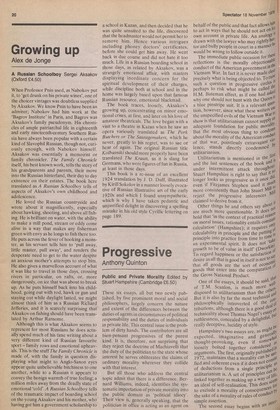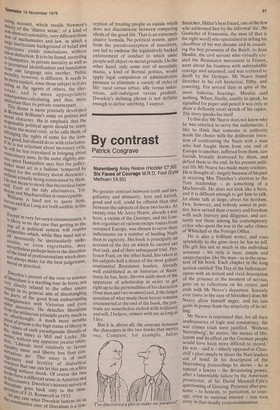Progressive
Anthony Quinton
Public and Private Morality Edited by Stuart Hampshire (Cambridge £6.50) These six essays, all but two newly published, by five prominent moral and social philosophers, largely concern the nature and extent of the differences between the duties of agents in circumstances of political responsibility and the duties of individuals in private life. This central issue is the problem of dirty hands. The contributors are all bien-pensant progressives of the purest kind. It is, therefore, not surprising that they reject the doctrine of Machiavelli that the duty of the politician to the state whose interest he serves obliterates the claims of ordinary morality wherever they collide with that interest.
But all those who address the central topic admit that there is a difference. Bernard Williams, indeed, identifies the systematic importation of private morality into the public domain as 'political idiocy'. Their view is, generally speaking, that the politician in office is acting as an agent on Spectator 18 November i9 behalf of the public and that fact allows biril to act in ways that he should not act on his own account in private life. An analogY is drawn with the lawyer who may rightly bec' tor and bully people in court in a manner be would be wrong to follow outside it. The immediate public occasion for these reflections is the morally objectionable conduct of the American government in the Vietnam War. In fact it is never made clear precisely what is being objected to. To rals,e such a question in progressive circles Is perhaps to risk what might be called ale, H.M. Bateman effect, as if one had askeu why one should not hunt with the Quorn a blue pinstripe suit. It is a relevant clues' tion, however, since what these writers usc the unspecified evils of the Vietnam Wa%tvn show is that utilitarianism cannot supPlYL adequate foundation for public But the most obvious thing to condo', about the morality of the American conda' of that war, pointlessly extravagant lence, stands directly Condemned '1' utilitarianism. Utilitarianism is mentioned in the fiirs.st and the last sentences of the book an' it under intermittent attack throug1010' Stuart Hampshire is right to say that longer looks as progressive as it once even if Fitzjames Stephen used it nnicta more consistently than John Stuart reject the progressive inferences claimed to derive from it.
Other things he and others say abnu ,,t t are much more questionable. It does II; hold that 'in the context of practical reas°„t on moral issues, rationality entails c0n5ta1 calculation' (Hampshire); it require 01 " calculability in principle and the putting °in s principle into practice from time to time,e an experimental spirit. It does not In growth to be of value in itself' (Dworki/loi To regard happiness or the satisfaction desire as all that is good in itself is not to sa.Ic that all goods are the sort of econotalof goods that enter into the computation the Gross National.Product. One of the essays, it should be said, thif of T.M. Scanlon, is much more Wers, disposed to utilitarianism than the othead But it is also by far the most technical a 0. philosophically introverted of the clof tributions, although there is a good dea'00 technicality about Thomas Nagel's essaYbot ruthlessness, concealed by a delightful, really deceptive, lucidity of style. ht Hampshire's two essays are, as 111-g be expected, imaginative and gene.„1.-tial thought-provoking, even if sotner loosely bolted together considered A in arguments. The first, originally publisbeuai. 1972, maintains that a morality can be 'Isis( fied and coherent even if it does not eon as of deductions from a single principle he utilitarianism is. A set of principles elle, linked together as making up a way °f,eio an ideal of self-realisation. This does s'fof to exclude a morality of consequeneest by the sake of a morality of rules of conchic simple assertion. iota' The second essay begins with an e,sting account, which recalls Newman's theory of the 'illative sense', of a kind of non-abstract rationality, very different from that , of mathematics and law, in which a large inarticulate background of belief and experience yields conclusions without linear deduction. It is to be found, according Hampshire, in private morality as well as p Perceptual identification and translation from one language into another. Public Morality, however, is different. It needs to be more explicit, since those subject to it are acting as the agents of others, the electorate, and is more appropriately e°nsequence-catculating and thus more utilitarian than its private counterpart. This theme is more precisely developed in Bernard Williams's essay on politics and moral character. He is emphatic that the responsible political agent should be ready .0 incur the moral costs, as he calls them, of Infringing the rights of some for the corn good but should do so with reluctance. he is not reluctant about necessary evils, he will be less restrained in bringing about unnecessary ones. In the same slightly anxj°us spirit Hampshire says that the policymaker must act in a fashion 'tempered by respect for the ordinary moral decencies', do actually being constrained by them. eo not mean to mock this theoretical loose „ad. each of the tidy alternatives, Tol'0Yan and Machiavellian is unacceptable. ,eWilliams is hard not to quote from. eves and Kai Lung are both audible in this Passage: .Rxcept in very favoured circumstances, it is likely to be the case that getting to the e top of a political system will req uir Properties which, while they need not at all necessarily be spectacularly undesirable or even regrettable, may nevertheless perhaps lean in the direction Of the kind of professionalism which does not always make for the best judgement, 'floral or practical.
)). work in ' s pursuit of the core or essence vot liberalism is a startling tour de force, not :I/ closely related to the other essays tlXeePt in its general aim of disentangling e„e,, Party of the good from embarrassing eLanglernents with Victorian and even Older ancestors. He detaches liberalism La_olin the utilitarian principle pretty much as " afterthought A much more notable ee Pie — • th of jetsam is the high status oflibertym iii"e values of such paradigmatic liberals of e Olden times as Mill and Locke. He t. rites, without any apparent jocular intenel°n, 'Liberals tend relatively to favour s„tvati qualitY more and liberty less than c°11LC,:ves do'. This essay is of such . t",.genuity and fertility of dialectical • that one can let this pass on a first t Lading Without shock. Of course the two and have a different sense in America a ,„uo 'tits country. Dworkin's historic survey of gtleralism goes back only to the inauration of F.D. Roosevelt in 1933. s At any rate what Dworkin fastens on a_ ale constitutive core of liberalism is a CO ception of treating people as equals which does not discriminate between competing ideals of the good life. That is an extremely elusive formula. No political system, apart from the pseudo-exception of anarchism, can fail to endorse the legislatively backed enforcement of conduct to which some people will object on moral grounds. On the other hand, only some sort of moralistic mania, a kind of Borstal politics, would apply legal compulsion or administrative pressure to eliminate a variety of styles of life: rural versus urban, idle versus industrious, self-indulgent versus prudent. Dworkin's defining phrase is not definite enough to define anything, I suspect.



































 Previous page
Previous page